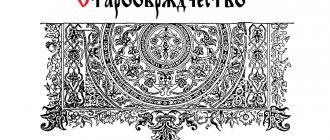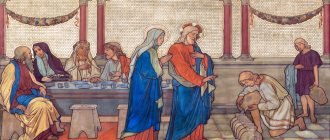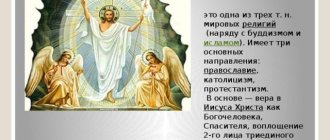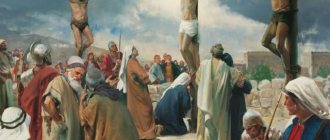Why is Orthodoxy true?
The history of the emergence of Christianity - and the writing of the New Testament texts - is studied within the framework of a science called biblical studies. Among biblical scholars there are Christians of different confessions, Jews and non-believers. Although there are some differences among scholars, they all agree on a number of historical facts.
First, Jesus Christ existed as a historical person. The so-called “mythological theory”, which denied His historical reality, is not supported by any of the specialists - including non-believers. As Bible scholar Bart Ehrman (a non-believer and self-described “atheistic agnostic”) writes in his book “Did Jesus Exist?”: “None of these works [denying the historicity of Jesus] were written by a New Testament scholar.” and early Christianity, who would teach in the largest and even more or less visible, accredited theological seminaries, universities and colleges in the USA and Canada (or other countries of the world). As far as I know, of the thousands of specialists in early Christianity working in these educational institutions, not one doubts that Jesus existed."
Secondly, Jesus died on a Roman cross - a fact that no one doubts either. As the same Ehrman writes, “The Messiah was expected to overthrow his enemies - and if you were going to invent a Messiah, you would invent a powerful Messiah. You wouldn't invent someone who was humiliated, tortured and killed by his enemies."
Thirdly, soon after His terrible death, the disciples began, with unshakable conviction, to proclaim and preach that He had risen from the dead - and threats, persecution, and torture and execution could not silence them. It was from this preaching that the Church grew.
Of course, unbelieving researchers - the same Ehrman - deny the reality of the Resurrection itself. But no one denies that the Christian Church was born from the fiery faith of the disciples that Jesus Christ rose from the dead.
How can we explain this faith? From the outside she looks extremely strange. Death on the Cross is a more than convincing way to demonstrate to the followers of the executed man that they were tragically mistaken in their expectations. The one whom they accepted as the Messiah, the Savior sent by God, not only did not save anyone, but he himself turned out to be powerless in the face of his enemies, who subjected him to torture and humiliation with impunity, and killed him in the most shameful and disgusting way.
The Gospel itself is very harsh on the Apostles in this regard and does not hide their deep discouragement and confusion after the death of Jesus.
Something had to happen. Something that convinced them that their Teacher, whose ministry ended with such a terrible death, was in fact not only the Messiah predicted by the Prophets, but also the Lord, the Savior, the Judge of the living and the dead.
Of course, people who are strictly committed to the materialistic picture of the world will insist that everything happened, except for such a supernatural event as the Resurrection - which, in their picture of the world, could not have happened, because it could never have happened.
But if we don't find materialism compelling—and we have good reason to—we have no reason to reject the most obvious explanation: The apostles are telling the truth. Christ truly rose from the dead.
And if this is so, God is clearly at work in the story of Jesus, and thus puts His stamp of approval on everything Jesus said and did. If this is so, we can trust God that the testimony of Jesus' words and deeds that we find in the New Testament has come to us in the form He intended.
Orthodox Life
Reflections and facts.
Saint Justin of Serbia: “Man is the highest mystery for man.”
Throughout the history of the world, people have thought differently about man and his purpose. The main thing from which people base their idea of a person is their faith. If an atheist believes that there is no immortality, then for him a person is a piece of meat, a dead man on vacation. If the modern occultist believes that there is a superior race, then he treats those who are not part of this minority accordingly. If a Buddhist believes that nothing exists and personality is an illusion, then for him there is no value for human life, and there is no deep understanding of it.
Even in ancient times, pagan religions, Greek, Roman, Chinese, Japanese tried to think through and understand the mystery of man. They reached the point (or rather, this knowledge was preserved from Adam) that in man there is something of the life of the gods. But in general, the pagan view of man, both then and now, is gloomy: “man is a small world in a big one” and “people live in the universe like mice in a house - enjoying the splendor of the cosmos, although it is not intended for them.
All the people of the earth know that there is a certain correct attitude towards people, and all people agree that no one lives like that.
The pagans could not understand why people live. There were lofty ideas, for example, among the Vikings: “bravely resist a predetermined fatal outcome.” That is, I know that I will die, but I will act according to my duty. Confucius in China and the Stoics in Rome speak about the same action out of duty. But what is all this for? There is no answer. Rabbinic schools in the East held a debate on the topic “Why does man live?” And they decided that it would be better for a person not to be born at all. For the pagan, both ancient and modern, life appears as suffering in darkness.
The gods of the pagans also do not answer the question of meaning - they are indifferent to people, and the supreme deity who created the cosmos is, in their minds, absolutely indifferent.
And yet, here and there voices are heard that the Supreme God is kind and good. This is what Socrates and Heraclitus teach, and some others agree with them. But at the same time, this God is far away and there is no way to get through to Him.
By the 1st century, there was a common longing for a Savior who would save the world from the purposelessness of existence; the philosopher says: “Either some god will save us, or everything will perish.” The feeling of doom and purposelessness was universal. At least for those who thought about life.
And then meaning came to the world - the Incarnation of Christ and the Resurrection changed everything and brought meaning to human life, if only a person himself wants to become a participant in the life of God, since the Trinity is genuine life and people really yearn for God. In Him is the answer to all questions, to all longing, the explanation of everything. The meaning of life, revealed by Christ, is union in love with Him and with other people, which takes place in the Church.
A. Losev: “In the ancient world, the sense of personality was less developed. Personality was not something unique and unrepeatable there.” Obviously, this was because there was no final goal. According to G. Chesterton, if there is no sense of purpose, then a meadow of flowers is no different from a dung heap. The pagan looks at the grass and rejoices that there is grass in the world. A Christian looks at the grass and rejoices that there is love in the world. The value of a person can only be in God, in the one who loves. So it is on earth. Laura and Beatrice are so famous and significant because they were loved.
Saint Cyril of Jerusalem: “All souls are equal from the beginning.” But this is equality between different people.
G. Chesterton: “God created each blade of grass separately and never got tired.”
What does Orthodoxy say about man? Saint Macarius the Great: “Look what the sky, earth, sun and moon are like: and the Lord did not deign to rest in them, but only in man. Therefore, man is more precious than all creatures, even, I dare say, not only visible, but also invisible, that is, ministering spirits.” Saint Macarius the Great: “The heart itself is a small vessel, but everything is there.” Including everything that is in the world, a person also carries within himself what is not in the world - God's grace, God Himself. Orthodoxy speaks of the mystery of the human person. Personality as the image of God is a mystery that goes deep into God. Clive Lewis: “When all the suns are extinguished, each of us will live. How amazing it is to live among the gods, knowing that the most boring, the most pitiful of those we see will shine in such a way that we could not bear it now... You have never communicated with mortals. Nations, cultures, works of art are mortal. But we joke, we work, we make friends with immortals, we marry immortals, we torture and humiliate immortals.” Just as a person can never get tired of worship, so another, loved one can never get tired of it. In eternity, our growth in the knowledge of God will be eternal, and so will our knowledge of another person in love. He will be able to reveal himself to us more and more, but there will never be a limit to this movement of love for another, because the Image of God is infinite, God in man is infinite. Therefore, Orthodoxy is sensitive to man. When young Veniamin Fedchenkov asked one priest: “How should we treat a person in general?” - he replied: “With reverence.” The Holy Fathers of Egypt said: “Have you seen your brother? You have seen your God! Simeon Frank: “Experience others as light.” Elder Vitaly Sidorenko: “Take every person for a god after God.” People are more immortal than the world - the world after the Second Coming will change and become new, and we will retain our personality, only the personality must be cleansed of evil.
Christianity opened the inner world of man, pointed out the movements of his soul, testified that man is abnormal without God, and the path to Him is repentance. Only repentance can really change us. Bishop Mitrofan Nikitin said that God did not put anything between the Kingdom of Heaven and repentance. Repentance transforms us. Elder Paisios of Athos advised photographing a person before and after confession, so that you can see how the face changes. It really becomes lighter, permeated with the Almighty.
We can trust God, and He expects trust from us. John Krestyankin taught throughout his life to trust the Creator. No other religion knows trust in God except Christianity. Christianity also divided good and evil, and paganism, then and now, believes that good cannot exist without evil and there is no light without shadows.
Joy is the fruit of communion with God.
Saint Basil the Great: “Joy dwells in the soul of the virtuous.”
Clement of Alexandria: “Joy is the main characteristic of the Church.”
We find joy in our beloved friend. Beloved others are heaven. The face of a loved one is a source of eternal joy.
A person only finds himself by completely giving himself to God. Unmerged connection. Man is the servant of everything. Real man is the glory of God.
“Tell me about the visions you see,” a certain monk once said to St. Pachomius (286–346). “A sinner like me does not expect visions from God,” answered Pachomius, “<...> but let me tell you about a great vision: a holy and humble person is a great vision. For what could be greater than to see the invisible God revealed in His temple—visible man?”
To know a person, you need to look at God. Each person is connected with all of humanity: “If you touch it at one end of the world, it will respond at the other,” says F. Dostoevsky.
As he sacrifices himself and lives for others, a person begins to live by Christ. Then he perceives others as his own relatives. The saints grew in holiness gradually, step by step. Holiness is our goal, and this goal is achievable.
People, as a rule, live in a state of hostility towards everyone, even those closest to them. Even in families, people are most often alone and feel misunderstood and useless to anyone. According to Ivan Ilyin, only love can overcome loneliness. People live in a state of disunity because they are ruled by passions. They do not have true love even for themselves, loving themselves in acquisitions, in things, in money. All this brings them pain. The only way out may be to return to others, to overcome alienation.
But the basis of this alienation is nothing other than sin. It is he who divides people, makes them unable to accept another into their hearts. Orthodoxy indicates the path to restoring relationships with people through restoring relationships with God. This is accomplished through repentance and living for others.
Only the faith that descends with a person into his soul and leads him out of his own darkness into an unimaginable light will be real.
G. Chesterton. “Autobiography”: “Precisely because evil lurked in the sphere of feelings and imagination, it could only be defeated by confession, with which loneliness and mystery end. And only one religion dared to descend with me into the depths of my soul.”
And this religion is Christianity.
Artyom Perlik
Is it possible to prove the existence of God?
“According to your faith, be it done to you” - we see such words in the Holy Scriptures. Many believers understand these lines to mean that the Lord does not need any evidence or facts, and we must accept His existence solely on faith.
The question of the relationship between faith and reason has always worried Christians
This path is possible, and many people have come to deep, sincere faith solely with their hearts, without any reasonable arguments. Thus, many early Christians were extremely uneducated people by worldly standards; they knew neither science nor even basic literacy. These were simple hard-working people, whose whole life was spent caring for their daily bread and having something to feed their own family. Such people did not go into either philosophy or theology - they simply knew nothing about them. But this did not prevent them from accepting Christ with their hearts, following Him and being awarded the crown of holiness.
What is true Christianity?
Telegram channel @ieshua.org
(1) True Christianity has always affirmed the inspiration, sufficiency and supreme authority of Holy Scripture. It taught that God's written Word is the only infallible rule of belief and practice in religion; that God commands that nothing be believed that does not come from this Word; and that anything contrary to it is not the truth. It has never allowed the opinion or teaching of the Church to be elevated above or on the same level as Scripture. It steadfastly adhered to the principle that, despite our imperfections, we can understand it, that the Ancient Book was intended to be the only standard of life and teaching.
(2) True Christianity has always taught the complete sinfulness, guilt, and depravity of human nature. It told people that they were born in sin, deserved God's wrath and condemnation, and were naturally inclined to do evil. It has never entertained the idea that men and women are merely weak and pitiable creatures who, if they will, can become good and make their own peace with God. On the contrary, it steadily affirmed the danger of man's condition, his detestability, and the need of Divine forgiveness and atonement for his sins, of a new birth and conversion, and of a complete change of heart.
(3) True Christianity has always pointed people to the Lord Jesus Christ as the highest object of faith and hope in religion, as the Divine Mediator between God and people, as the only source of peace in the heart and the root of all spiritual life. The main truths which it has always affirmed about Christ are the atonement for sin accomplished by His death, His sacrifice on the cross, complete deliverance from guilt and condemnation through His blood, His victory over death through the resurrection, His effectual intercession at the right hand of God, and the absolute necessity of our simple faith in Him. In short, it spoke of Christ as the Alpha and Omega of all Christian theology.
(4) True Christianity has always honored the Person of God the Holy Spirit and His majestic work. It never taught that all professing Christians have the grace of the Spirit in their hearts as a matter of course because they were baptized, or because they joined the Church. It steadfastly held to the truth that the fruit of the Spirit is the only evidence of the possession of the Spirit, and that this fruit must be visible! It has always taught that we must be born of the Spirit, led by the Spirit, sanctified by the Spirit, and feel the working of the Spirit; and that walking closely with God in the paths of His commandments, a holy life, love, self-denial, purity and zeal for good, are the only reliable signs of the presence of the Holy Spirit.
This is true Christianity. It would have been good for the world if there had been more of it during the last nineteen centuries! Too often and in too many areas of Christianity, so little of it was visible that it seemed as if the religion of Christ had died out and been completely disgraced! It was this Christianity in the days of the apostles that was the “worldwide troublemaker”! It was this that deprived the pagan temples of their worshipers, exposed the madness of the Greek and Roman philosophers, and forced even the pagan writers to admit that the followers of the “new superstition” - as they themselves said - were people who loved each other and lived very pure and holy lives!
Let us never forget that its main principles are least pleasing to the soulful person. On the contrary, they are considered decidedly unpopular and offensive. The proud man does not like to be told that he is a weak, guilty sinner who cannot save his soul and must rely on the work of another, that he must be converted and receive a new heart, that he must live a holy life of self-denial and get out of the world. And yet, such Christianity today flourishes wherever true good is done. The only religious teaching capable of producing lasting positive results gives preference to those doctrines which I have attempted to describe. Wherever they are taught correctly, Christianity can bear fruits that contain indisputable confirmation of their Divine origin.
Countless numbers of professing Christians who have no life or reality in their religion are merely formal members of the Church of Christ. Apart from going to church on Sundays, they show no signs of true Christianity. If you observe their daily life, you will find that they have no thoughts, no feelings, no care for their souls, for God or for eternity. Those men and women who fill churches on Sunday and then live worldly and carnal lives during the week are the devil's best and most effective allies.
True faith is not merely a "mental assent" to certain theological propositions, but it is life, it is burning, it is an active principle, working through love, purifying the heart, conquering the world, and bearing much fruit in holiness and good works. Let us always live as believers in every jot and tittle of Scripture, as if the dead, risen, interceding, and coming Christ were always before our eyes!
John Charles Ryle (1816–1900) served for many years as Bishop of the Church of England in Liverpool, England. He was a prolific preacher and writer whose books and published sermons continue to influence readers a century after his death. His books published in Russian include such well-known works as “Practical Religion” and “The Upper Room”.
propovedi.ru
Donate Last: 02/28. Thank you!
Subscribe: Telegram • Facebook • • • Twitter • Instagram • Youtube
More on the topic:
- Don't trust your Christianity
- We believe in the Holy Spirit
- "I Never Knew You": The Fatal Delusions of Lost Religious People
- Receive the Holy Spirit










